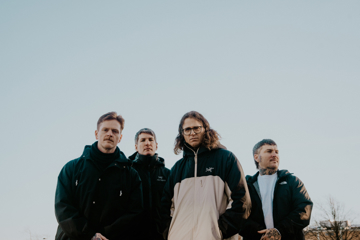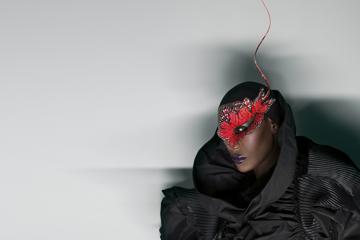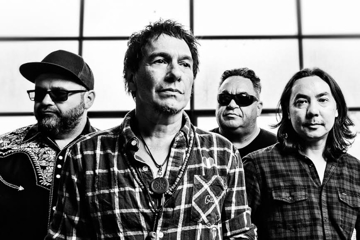From The Underground
"Most of the vocalists on our album, aside from Emeli Sande and Alex Clare, were up-and-coming talents we found around London."

udimental seem relatively easy to categorise. Their hit singles, debut album, lifespan and genealogy sketch out a pretty conventional career arc. Formed in 2010, it's only taken them three years to transition from anonymity to ubiquity. Their 2012 single, Feel The Love, debuted at #1 on the UK charts. Their 2013 debut album, Home, did likewise.
They're pop producers. Drawing heavily on UK-specific dialects like drum'n'bass, garage and funk, they've strategically collaborated with popular soul vocalists (Emeli Sande, for example) to invade the mainstream. They're Mark Ronson. They're Chase & Status. Surely? Co-founder Kesi Dryden politely disagrees.
“We don't want to be misunderstood as a pop act,” the producer says. “A lot of pop acts are manufactured and we are the opposite end of that. There's a real traditional vibe. We write the songs together, we produce together and we perform live on stage together. There's nothing manufactured about it.”
There's actually a lot more to the group than their immediate success would suggest. For starters, their history stretches a lot further back than 2010. While Rudimental was only officially assembled in 2010, most of the group's four members have known each other since they were kids.
Don't miss a beat with our FREE daily newsletter
“Yeah, that's true. The four of us have individually been producers and songwriters for a number of years now. Through our teenage years, that's what we got into and that was our hobby growing up. About six or seven years ago, we decided to start doing stuff together.
“We've all been friends from a young age and we've all been making music, but it's only been in the last six or seven years that we really thought about working together and that's when stuff really started to take off. We started DJing on pirate radio stations in the UK and just spreading our sound – and we got a really great response.”
Initially, Rudimental had a lot of difficulty selling their sound to labels. Their decision to blend their drum'n'bass and garage instrumentals with old-school soul and reggae flavours stood at odds with increasingly popular styles like brostep and EDM. It's only by virtue of a label's commitment to experimentation that they're enjoying their current success.
“It was probably what the public had been waiting for – a bit of dance music with a bit of soul,” Dryden suggests. “I think the chart scene in the UK went into a bit of a bad place. There was a lot of music was coming out that was sort of soulless. People would produce a track, send it off; somebody else would write it, send it off; somebody would vocal it, send it off. There was no connection with the music. We like to write songs from scratch and be a part of the whole process. We'll never ever make a beat and just send it to somebody. We have to be there. That's what it's all about. That's how you get the traditional vibe. I think the UK was waiting for something like that to happen.”
There's a lot of depth to the quartet's work. Not just musically, either. They've a strong social conscience. Prior to their mainstream breakthrough, each member of the band was involved in assisting underprivileged youth on a professional basis. It's actually something Kesi Dryden would like to continue as Rudimental grow more successful.
“Definitely. We've all come from working with underprivileged kids in different areas in London. Often, areas seen as negative areas. It's a big part of us; giving back to the community. It's kind of what Rudimental is all about... that whole community vibe. Even when we go on stage, we feel like a little community.”
Even in their collaborations, they've maintained a community outlook. Their album is rife with unknown vocalists and performers that Rudimental have tried to give a platform – John Newman, for example. Originally unknown, he's followed up his success with Rudimental's Feel The Love with his own chart-topping hit, Love Me Again.
“Most of the vocalists on our album, aside from Emeli Sande and Alex Clare, were up-and-coming talents we found around London,” Dryden explains. “A number of people we've worked with for a long time and a number of them, like John, we just found at open mic nights. It's great to give a platform to these artists. You know, it was only a year or 18 months ago that we needed a leg-up, so it's great to be able to turn around and help out other artists as well. To turn around and see people like John develop their own successful solo career on the back of that is just a wonderful feeling.”
Rudimental aren't opposed to popular success. They're simply opposed to cynicism – music as product. Their ambitions are clearly linked to getting their music heard by a wide array of audiences. It would be dishonest to claim otherwise. Still, they want to do it organically and respectfully. With integrity, in other words.
“It can get a bit worrying, at times. We don't want to get seen as a pop act. At the same time, though, it's great that our music is transferring across to a popular audience. It's good to see that a lot of people are enjoying our music. It's a hard balance to crack – but we believe we're making music the right way.
“Hopefully, people will understand that,” he smiles. “This is our first album and I think we've got a long way to go and a lot more to come out of us. You know, we've been working together for a long time, but we've only just got the opportunity to do this full time. It's just the start of Rudimental.”







